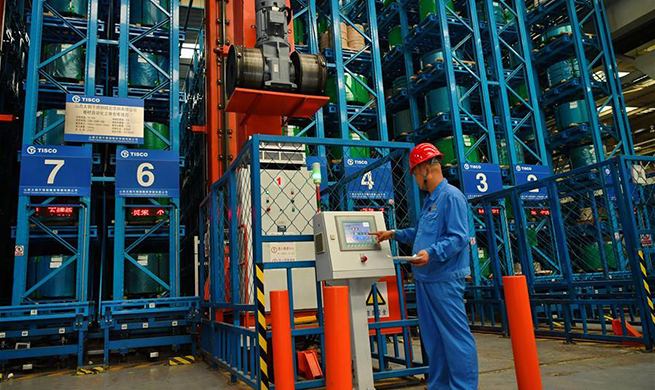BERLIN, June 4 (Xinhua) -- Without setting a price for carbon emissions, Germany's phase out of coal by 2038 might even increase CO2 emissions on the European level, according to an analysis by the Potsdam Institute for Climate Impact Research (PIK) on Tuesday.
To make sure the coal phase-out really helps stabilize carbon emissions, Germany's coal exit must be combined with a minimum price for CO2 or the cancellation of existing emission certificates to Germany prior to the coal phase-out.
"It is a strong signal that an industrialized country with high coal consumption such as Germany is deciding to phase out coal," said Michael Pahle of the Potsdam Institute for Climate Impact Research (PIK).
However, Pahle stressed that now "we need effective political tools to ensure that the forthcoming implementation of the coal commission's decision actually reduces climate-damaging CO2 emissions."
According to the analysis, the shutdown of coal-fired power plants in Germany would decrease the supply of electricity and consequently increase the price of electricity. As a result, the remaining coal-fired power plants would increase their production and thus emit more CO2.
Secondly, Germany's coal phase-out would reduce demand for emission allowances in the European Emissions Trading Scheme (ETS). Electricity producers of other European countries could increase their CO2 emissions and eventually neutralize or even revert the emissions reductions achieved in Germany.
In order to prevent a mere relocation of coal-fired power generation and thus of CO2 emissions from Germany to its European neighbors, German emission allowances could be cancelled. However, this would "potentially cost Germany roughly 19 billion euros by 2050", according to the study.
"These risks have so far been underestimated," Christian Flachsland, co-author of the Mercator Research Institute on Global Commons and Climate Change (MCC) said.
According to the German institute PIK, even the newly introduced market stability reserve (MSR) in the European Emissions Trading Scheme would not help. Although it is designed to take allowances off the market, "the bottom line is that the ETS in its current form cannot guarantee that the coal phase-out will bring by additional emission reductions," co-author Flachsland added.
The analysts are calling for the introduction of minimum price on CO2. Following the introduction of such a price between 30 to 60 euros per ton in 2030, Germany's national climate targets in the electricity sector would be achievable.
"If a front-running group consisting of Germany, France, the Netherlands and a few others were to introduce such a minimum price, this could be an important step towards an EU-wide minimum price," stressed Ottmar Edenhofer, Director of PIK and MCC and co-author.
"The minimum price is an insurance against market and regulatory uncertainties -- and thus ultimately also an insurance against the real risks of climate change, such as more and more extreme weather," Edenhofer added.













